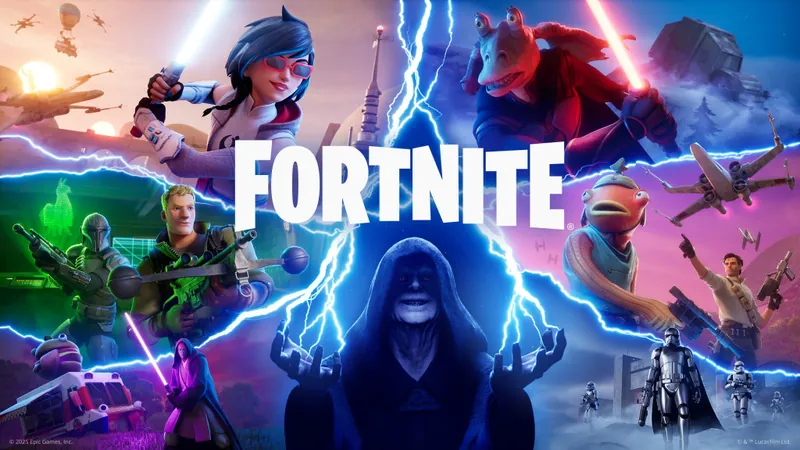
Fortnite Under Siege: iPhone Users in the US and EU Left High and Dry!
2025-05-19
Author: Ming
As of May 19, 2025, Fortnite is officially offline for iPhone users in both the U.S. and EU, and the reason is a bitter battle between Epic Games and Apple.
Epic Games has announced that the global ban on iOS remains in place until Apple decides to lift the restrictions and reinstate Fortnite in the App Store.
Apple claims Epic mishandled an app update, but insists it hasn’t eliminated Fortnite from third-party marketplaces. This feud traces back to a long-standing legal war over Apple’s hefty 30% commission on purchases, which Epic argues violates U.S. antitrust laws.
On May 16, Epic filed a motion in court demanding Apple adhere to prior rulings and allow Fortnite's comeback on iOS. However, Apple's silence outside business hours raises eyebrows about their responsiveness.
An Ongoing Legal Saga with Billions at Stake
This temporary ban is merely the latest twist in a fierce legal saga that began in August 2020 when Apple removed Fortnite from its App Store after Epic tried to sidestep the payment system to dodge the 30% fee. The backlash was immediate, impacting around 116 million iOS players and throwing Epic into a social media frenzy with their #FreeFortnite campaign.
Financially, the stakes are astronomical. Apple’s App Store generated a staggering $26.3 billion in just the first quarter of 2025, and even a slight reduction in fees could translate to losses in the billions.
Despite a federal judge ruling primarily in Apple's favor back in 2021, Epic managed to claim victory on one front regarding anti-steering policies that kept developers from informing users about alternate payment options.
In a bold move, Epic’s CEO Tim Sweeney suggested a possible peace offering: if Apple introduces a payment system without hefty commissions, Fortnite could return to iOS, potentially ending the legal conflict.
Global Regulatory Pressure Mounts Against Tech Giants
The clash between Epic and Apple isn’t confined to the U.S.; Epic has initiated similar legal actions in Australia, the UK, and Europe, seeking to upend Apple’s app distribution practices.
The European Union's Digital Markets Act has already forced Apple to allow alternative app stores and payment systems, creating a patchwork of operational differences across regions. This regulatory shift explains why Fortnite was able to briefly return to iOS in Europe before the latest restrictions.
A recent ruling by Judge Yvonne Gonzalez Rogers found Apple in violation of a 2021 antitrust order, accusing the company of prioritizing profits over compliance.
The Commission Conundrum: Epic vs. Apple
The ongoing battle reveals stark contrasts in commission structures: while Apple demands up to 30% on in-app purchases, the Epic Games Store charges developers only 12%. This significant gap is central to Epic’s argument that Apple’s practices stifle competition and inflate costs for consumers.
Tim Sweeney consistently frames the legal fight as a crusade for better conditions for all developers, arguing that a win could foster a more equitable environment for smaller, independent developers who lack negotiation clout.
On the other hand, Apple defends its policies as beneficial for developers, claiming they have seen increased revenue through its platform, underscoring the fundamental debate between controlled and open market platforms.


 Brasil (PT)
Brasil (PT)
 Canada (EN)
Canada (EN)
 Chile (ES)
Chile (ES)
 Česko (CS)
Česko (CS)
 대한민국 (KO)
대한민국 (KO)
 España (ES)
España (ES)
 France (FR)
France (FR)
 Hong Kong (EN)
Hong Kong (EN)
 Italia (IT)
Italia (IT)
 日本 (JA)
日本 (JA)
 Magyarország (HU)
Magyarország (HU)
 Norge (NO)
Norge (NO)
 Polska (PL)
Polska (PL)
 Schweiz (DE)
Schweiz (DE)
 Singapore (EN)
Singapore (EN)
 Sverige (SV)
Sverige (SV)
 Suomi (FI)
Suomi (FI)
 Türkiye (TR)
Türkiye (TR)
 الإمارات العربية المتحدة (AR)
الإمارات العربية المتحدة (AR)